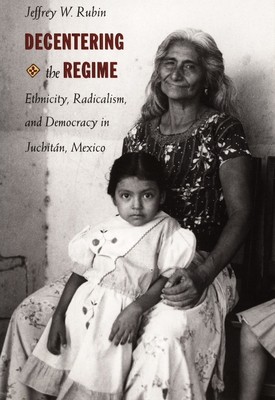
- We will send in 10–14 business days.
- Author: Jeffrey W Rubin
- Publisher: Duke University Press
- ISBN-10: 0822320630
- ISBN-13: 9780822320630
- Format: 15.3 x 22.9 x 2.4 cm, softcover
- Language: English
- SAVE -10% with code: EXTRA
Reviews
Description
Since 1989 an indigenous political movement-the Coalition of Workers, Peasants, and Students of the Isthmus (COCEI)-has governed the southern Mexican city of Juchitán. In Decentering the Regime, Jeffrey W. Rubin examines this Zapotec Indian movement and shows how COCEI forged an unprecedented political and cultural path-overcoming oppression in the 1970s to achieve democracy in the 1990s. Rubin traces the history and rise to power of this grassroots movement, and describes a Juchitán that exists in substantial autonomy from the central Mexican government and Mexican nationalism-thereby debunking the notion that a state- and regime-centered approach to power can explain the politics of domination and resistance in Mexico.
Employing an interdisciplinary approach, Rubin shows that the Juchitecos' ability to organize and sustain a radical political movement grew out of a century-long history of negotiation of political rule. He argues that factors outside the realm of formal politics-such as ethnicity, language, gender, and religion-play an important part in the dynamics of regional political struggles and relationships of power. While offering a detailed view of the Zapotec community and its interactions, Rubin reconceptualizes democracy by considering the question of how meaningful autonomy, self-government, cultural expression, and material well-being can be forged out of violence and repression.
EXTRA 10 % discount with code: EXTRA
The promotion ends in 19d.23:11:38
The discount code is valid when purchasing from 10 €. Discounts do not stack.
- Author: Jeffrey W Rubin
- Publisher: Duke University Press
- ISBN-10: 0822320630
- ISBN-13: 9780822320630
- Format: 15.3 x 22.9 x 2.4 cm, softcover
- Language: English English
Since 1989 an indigenous political movement-the Coalition of Workers, Peasants, and Students of the Isthmus (COCEI)-has governed the southern Mexican city of Juchitán. In Decentering the Regime, Jeffrey W. Rubin examines this Zapotec Indian movement and shows how COCEI forged an unprecedented political and cultural path-overcoming oppression in the 1970s to achieve democracy in the 1990s. Rubin traces the history and rise to power of this grassroots movement, and describes a Juchitán that exists in substantial autonomy from the central Mexican government and Mexican nationalism-thereby debunking the notion that a state- and regime-centered approach to power can explain the politics of domination and resistance in Mexico.
Employing an interdisciplinary approach, Rubin shows that the Juchitecos' ability to organize and sustain a radical political movement grew out of a century-long history of negotiation of political rule. He argues that factors outside the realm of formal politics-such as ethnicity, language, gender, and religion-play an important part in the dynamics of regional political struggles and relationships of power. While offering a detailed view of the Zapotec community and its interactions, Rubin reconceptualizes democracy by considering the question of how meaningful autonomy, self-government, cultural expression, and material well-being can be forged out of violence and repression.


Reviews